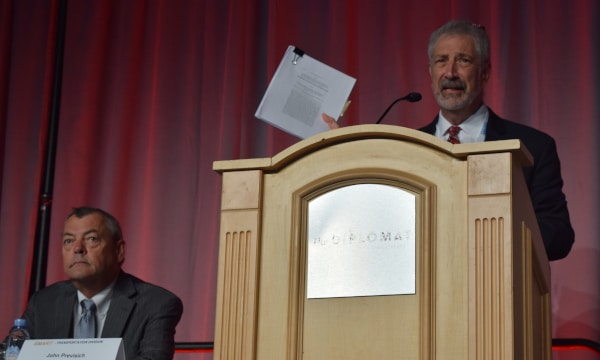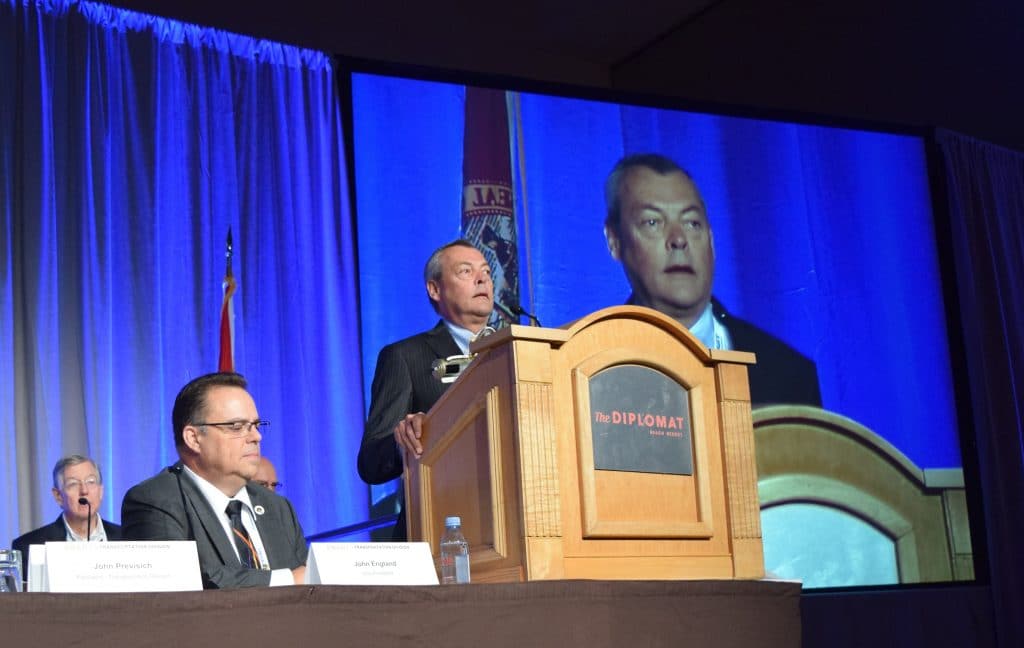https://youtu.be/VfiURJRJgWc?t=1s
HOLLYWOOD, Fla. — SMART Transportation Division General Counsel Kevin Brodar minced no words Tuesday, Aug. 7, when describing the 5-4 Janus v. AFSCME decision written by United States Supreme Court Justice Samuel Alito that was released this summer.
“His hate and loathing — and that’s being kind — for unions and working people drips from every page of this opinion, if that’s what you want to call it — an opinion,” Brodar said. “It’s less an opinion but more a right-wing manifesto as to how to eliminate unions.”
The 45-page Janus ruling taking away the ability of unions in the public sector to collect agency fees from “free-riders” has been an important topic at SMART TD’s Hollywood, Fla., regional meeting. In Monday’s combined opening session with Sheet Metal and TD sides in attendance, SMART General President Joseph Sellers Jr., General Secretary-Treasurer Rich McClees and TD President John Previsich all mentioned the precedent-destroying case.
Brodar, during the opening session of the second day, went into even more detail on the ruling.
“What Justice Alito tries to sell here is the two-century-old idea that unionism is just an excuse for legalized extortion,” Brodar said, holding up a printed copy of Alito’s opinion. “This case is an attack on working people. It’s an attack on all unions, not just public-sector unions. It’s an attack on this union.
“This is an attack on every one of you who goes out and does the hard work of defending the members, who goes out and does the hard work of standing against the tide of the carriers, who goes out and does the hard work of the long and tedious hours.”
Big-moneyed interests and industries have exacted a toll on workers throughout history – in injuries, blood and in some cases, human lives, Brodar said. In the early days of the labor movement, workers’ efforts to organize sometimes were met with armed responses intended to put down their resistance.
“No matter how many people were killed, however, the industrialists and the right-wingers and the conservatives and the business interests could not kill the idea of unions,” Brodar said. “They could not kill the cause because the cause is a righteous cause … You are the heirs to that fight.”
Those same forces that tried to suppress unions in the past exist today in the form of union foes such as Alito, the Koch brothers, the Federalist Society and other billionaire backers, Brodar said. This time, those enemies of labor are playing a long game with the Janus ruling being one step in their attempts to kill unions.
“Their new tactic is death from strangulation. They hope to dry up the union funds until the unions can no longer function and they just disappear and go away,” Brodar said.
The Janus decision “is essentially a green light for people to freeload” from public-sector unions, he said, and private sector unions likely will be next to be targeted.
“Look at the people sitting next to you. This affects your brothers and sisters in this room, in this union today, tomorrow,” Brodar said. “If you don’t think they are coming for the private sector, wake up and smell the coffee. That’s the next thing that is going to happen.”
Members will have to make a choice to fight back to preserve that which gives them a middle-class lifestyle, Brodar said. They can do that by educating their fellow members, their friends, neighbors and anyone else they can about what these anti-union forces are trying to accomplish through stacking the courts, trying to get right-to-work-for-less laws and other means.
“It’s up to us to respond. We can’t sit back, because if we do, we will disappear,” Brodar said. “We need to go out and educate every member every day, every way.”
Author: bnagy
A monthly report from the Switching Operations Fatality Analysis (SOFA) Working Group reported six severe injuries to railroad workers during May 2018, including one amputation.
SOFA Working Group defines a severe injury as FRA-reportable injuries to train and engine service employees that have a clear and verifiable diagnosis and meet one or more of the following four criteria: (1) potentially life threatening; (2) high likelihood of permanent loss of function, permanent occupational limitation, or other permanent disability; (3) likely to result in significant work restrictions; or (4) result from a high energy impact to the human body.
The amputation to a leg or foot occurred in Missouri when a worker was trying to cross on a moving car and fell from it at an industrial location.
Four of the other five severe injuries reported by SOFA were fractures that came as a result of falls, while the fifth severe injury was a fracture that came as the result of an alleged assault by a passenger.
The SOFA Working Group is a voluntary, nonregulatory railroad safety partnership consisting of representatives from SMART Transportation Division, the Brotherhood of Locomotive Engineers and Trainmen (BLET), Federal Railroad Administration (FRA), Association of American Railroads (AAR) and the American Short Line and Regional Railroad Association (ASLRRA) that has a goal of zero switching fatalities achieved through education and nonpunitive interactions.
Read an earlier story about SOFA’s first quarter report and its 2017 annual report.
Visit our SOFA page and read SOFA’s full reports.
The U.S. Senate confirmed two members to the National Transportation Safety Board (NTSB) on July 24.
General aviation safety advocate Bruce Landsberg was confirmed as vice-chairman of the NTSB and transportation veteran Jennifer Homendy was confirmed to fill an empty board seat.
Homendy was nominated to the position in April and will fill a term lasting until Dec. 31, 2019, that was vacated by Mark Rosekind. She has served as Democratic staff director for the U.S. House Transportation and Infrastructure Committee’s railroad, pipelines and hazardous materials subcommittee since 2004.
Prior to that, Homendy was a legislative representative for the International Brotherhood of Teamsters and has worked for the Transportation Trades Department (TTD) , AFL-CIO, the American Iron and Steel Institute, and the National Federation of Independent Business.
“She will bring to her new role a deep understanding of the needs, responsibilities, and obstacles faced by America’s frontline transportation workforce,” said Larry I. Willis, president of the TTD. “On behalf of our 32 affiliated unions, I offer our collective congratulations to Jennifer for this important achievement in her career, and look forward to continuing our work together to enhance transportation safety.”
Landsberg held leadership roles in the Aircraft Owners and Pilots Association (AOPA) Foundation and Air Safety Institute for 22 years before his retirement from the organization in 2014. He has frequently worked with the Federal Aviation Administration (FAA) and other regulatory agencies, and industry groups such as the Experimental Aircraft Association (EAA) and the National Air Traffic Controllers Association (NATCA).
Landsberg was nominated to serve as NTSB vice chair in September 2017 and is slated to serve a two-year term as NTSB vice chairman, with his term as a board member extending through Dec. 31, 2022.
The success of an initial workers summit held in the spring is leading to a second meeting to be held Aug. 3, reports Terry Sigler, a retired legislative representative of SMART TD Local 286 in North Platte, Neb.
Sigler said an April 6 meeting he organized drew about 100 members from various unions to during two sessions at the North Platte Quality Inn and Suites, 2102 S Jeffers St.
The second summit is scheduled for 1 p.m. Aug. 3 at the same location. Members from all unions are invited.
Confirmed to attend is state Sen. Mike Groene (R – Dist. 41). Invitations also have been extended to state Sens. Tom Brewer (Dist. – 43) and Steve Erdman (Dist. – 47) and U.S. Rep. Adrian Smith. Groene and Brewer were sponsors of a two-person-crew bill in the Nebraska Legislature.
“This will be a great opportunity to talk directly with them as we prepare to submit another two-person-crew bill with these senators’ help,” Sigler said.
A pair of final regulations were issued by the Federal Transit Administration (FTA) in July that rounded out the National Public Transportation Safety Program’s regulatory framework.
The Public Transportation Agency Safety Plan rule, taking effect July 19, 2019, requires transit agencies to incorporate Safety Management System (SMS) policies and procedures in the development of safety plans. The rule sets scalable and flexible requirements for transit system safety plans by imposing the appropriate regulatory burden in achieving safety goals.
Compliance with the rule is required within a year, and FTA plans to offer guidance to assist large transit agencies in their development of safety plans and SMS implementation. FRA said application of the rule to small and/or rural transit systems will be deferred in order to evaluate the safety risks posed by these systems and to determine the need for future regulatory action.
The Public Transportation Safety Training Certification Program rule establishes a training curriculum for those who have safety oversight of rail transit systems. The rule goes into effect August 20, 2018.
“Through these rules, FTA will enter a new era of safety and we will continue to work with our state and industry partners to enhance public transit’s safety record,” acting FTA Administrator K. Jane Williams said in a July 18 release.
The authority for FTA to create a National Public Transportation Safety Program and to give it nationwide transit safety oversight was initially granted in 2012 by Congress and then enhanced by 2015’s FAST Act. Prior to that, FTA primarily was a grant-making agency.
For more information, read the FTA release on the rules.
U.S. Sen. Chris Van Hollen, a Maryland Democrat, introduced S.3215 on July 16, a companion bill to the Bus Operator and Pedestrian Protection Act.
In June, Congresswoman Grace F. Napolitano (D – Calif.) and Congressman John Katko (R — N.Y.) introduced the original bill, H.R.6016, that would enhance the safety of bus drivers nationwide.
“Ensuring a safe work environment for transit operators is crucial to improving our transportation system for both passengers and employees,” Van Hollen said. “This legislation makes a long overdue push to improve safety conditions for these men and women — and invests the resources to make it happen.”
Immediately upon the legislation’s introduction, SMART Transportation Division leaders announced their support for the bill, and they also support Van Hollen’s bill.
“There have been gruesome, inexcusable acts that have been committed on our bus members including shootings, stabbings and beatings, and little has been done about it. We need adequate driver shields and mandatory de-escalation training,” said National Legislative Director John Risch. “Our pledge is to continue to work with Congress and the administration to ensure all bus operators are given the protection they deserve.”
Countless news reports of incidents involving spitting, beatings and stabbings by unruly passengers have left SMART TD bus drivers as victims of frequent violence. A college student critically injured in a stabbing April 9 while he rode on a bus owned by Montebello Bus Lines (MBL), whose workers are represented by Local 1701, died in June of his injury.
“Every day we hear major news stories of bus drivers being beaten, having items thrown at them, spitted upon, and verbally abused. LA Metro, for instance, which operates in my district experiences approximately 130 assaults on bus drivers per year,” Napolitano said in a news release. “This is an unthinkable experience for drivers, and it also has major safety impacts on passengers, motorists and pedestrians, as these assaults often occur while the bus is moving.”
Both the House and Senate legislation require transit agencies to develop Bus Operations Safety Risk Reduction Programs by implementing physical barriers to prevent operator assaults, de-escalation training for bus drivers, driver-assisted technology to reduce accidents and modified bus specifications or retrofits to reduce visibility impairments.
“There is no higher priority than operator safety. On a daily basis, we see reports of drivers getting assaulted and having their lives irreversibly changed because they were behind the controls just doing their jobs,” said SMART TD Bus Department Vice President Calvin Studivant. “This critical legislation will significantly improve bus driver safety through risk reduction programs and other safety requirements.”
The Bus Operator and Pedestrian Protection Act and its Senate companion bill continue to build on SMART TD’s efforts to protect bus drivers and eliminate operator assaults, but the effort of members is needed to get political leaders to support the legislation via the Legislative Action Center.
H.R. 6016 as of July 24 had 36 cosponsors — two Republicans and 34 Democrats. It has been referred to the Subcommittee on Highways and Transit.
S.3215 has been referred to the Senate’s Committee on Banking, Housing, and Urban Affairs and co-sponsors are being sought.



